An izakaya is a traditional Japanese establishment that serves small, intensely flavored plates that can stand up to a deluge of beer and sake. At this Gables spot, don't be afraid to call out your order for any one of the dozen and a half daily offerings scribbled on a chalkboard opposite the sushi bar. If it's any motivation, dishes such as the sweet vinegar-marinated yellow jack called aji nanban zuke ($6.50) sell out quickly. You'll also want to claim your hamachi or sake kama ($14) as fast as possible. They emerge from the kitchen sizzling hot, with a faint aroma of the fish's natural oils. But don't be fooled: This amorphous cut holds some of the juiciest flesh in the ocean. When the time comes for that second round, be sure to pair it with the hybrid omelet/fritter called okonomiyaki ($15.95). Sticky Japanese mountain yam is blended with egg and grilled into a crisp pancake that's topped with spicy mayo and gossamer shards of cured tuna loin. Finish it off with a carafe of sake. Kampai!
Best Japanese Restaurant
Su-Shin Izakaya
- 159 Aragon Ave., Coral Gables, 33134 Map
- 305-445-2584
- izakayarestaurant.com
Best French Restaurant
Frenchie's Diner
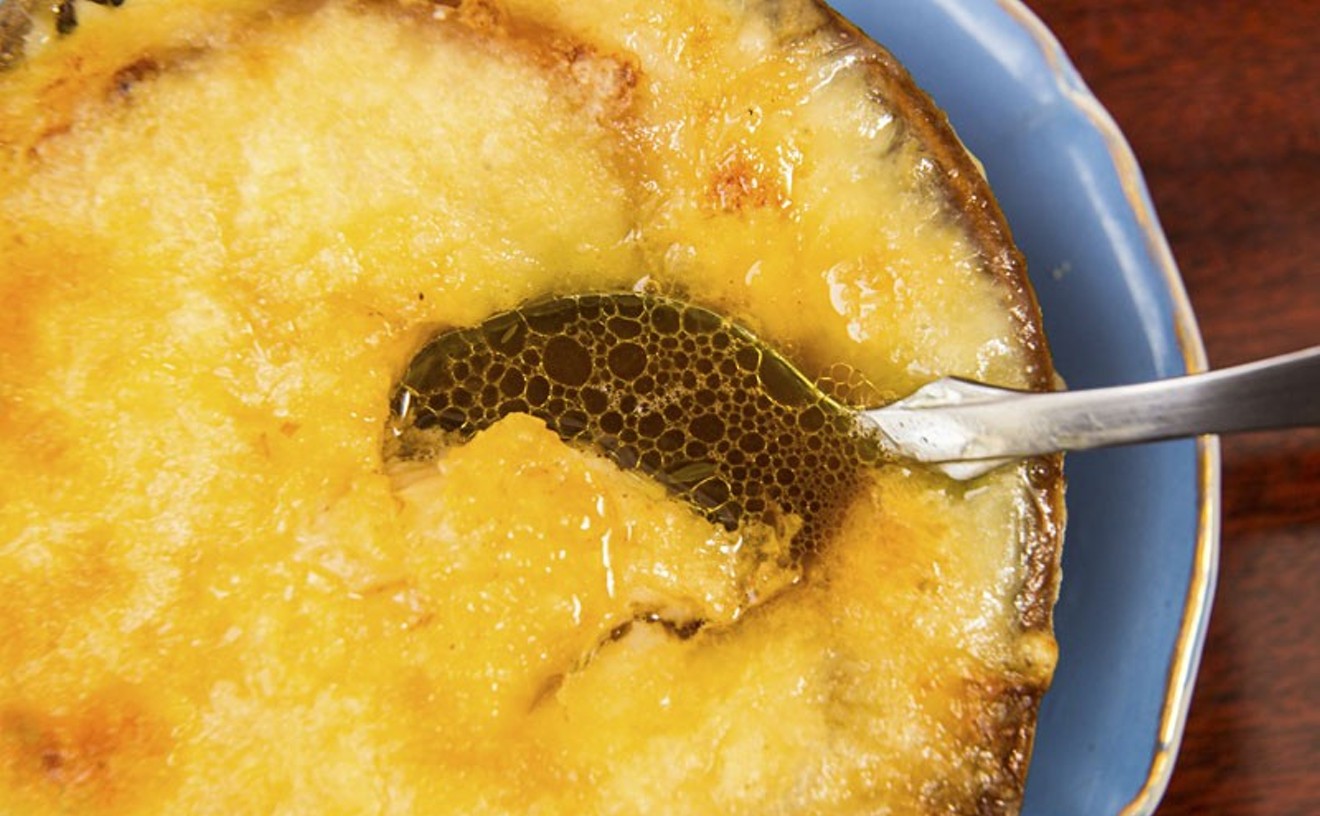
In the luxurious enclave that is Coral Gables, husband and wife Gabriel and Shannon Castrec run a place that can only be described as like walking into someone's home kitchen. Some days, you'll find pristine potato leek soup ($8) and a skillfully seared fillet of Florida pompano (market price) prepared with care and skill. Gabriel ensures your meal is as precise as any you'd find at a more formal establishment while doling out hugs and glasses of wine. The menu is an ever-changing affair and scrawled onto a chalkboard wall. Across the way are bowed shelves bearing dozens of bottles of French wines. The place is the closest thing Miami has to the inviting bistros of Nice, Lyon, or Paris. But what brings it home here is the relaxed atmosphere. No need to worry if the verdant shallot-and-herb butter covering escargots ($11) runs down your chin. And that spot of Gruyère on the table from your croque-monsieur ($12)? Ce n'est pas important.
- 2618 Galiano St., Miami, 33134 Map
- 305-442-4554
- www.frenchiesdiner.com
Best Brazilian Restaurant
Steak Brasil Churrascaria
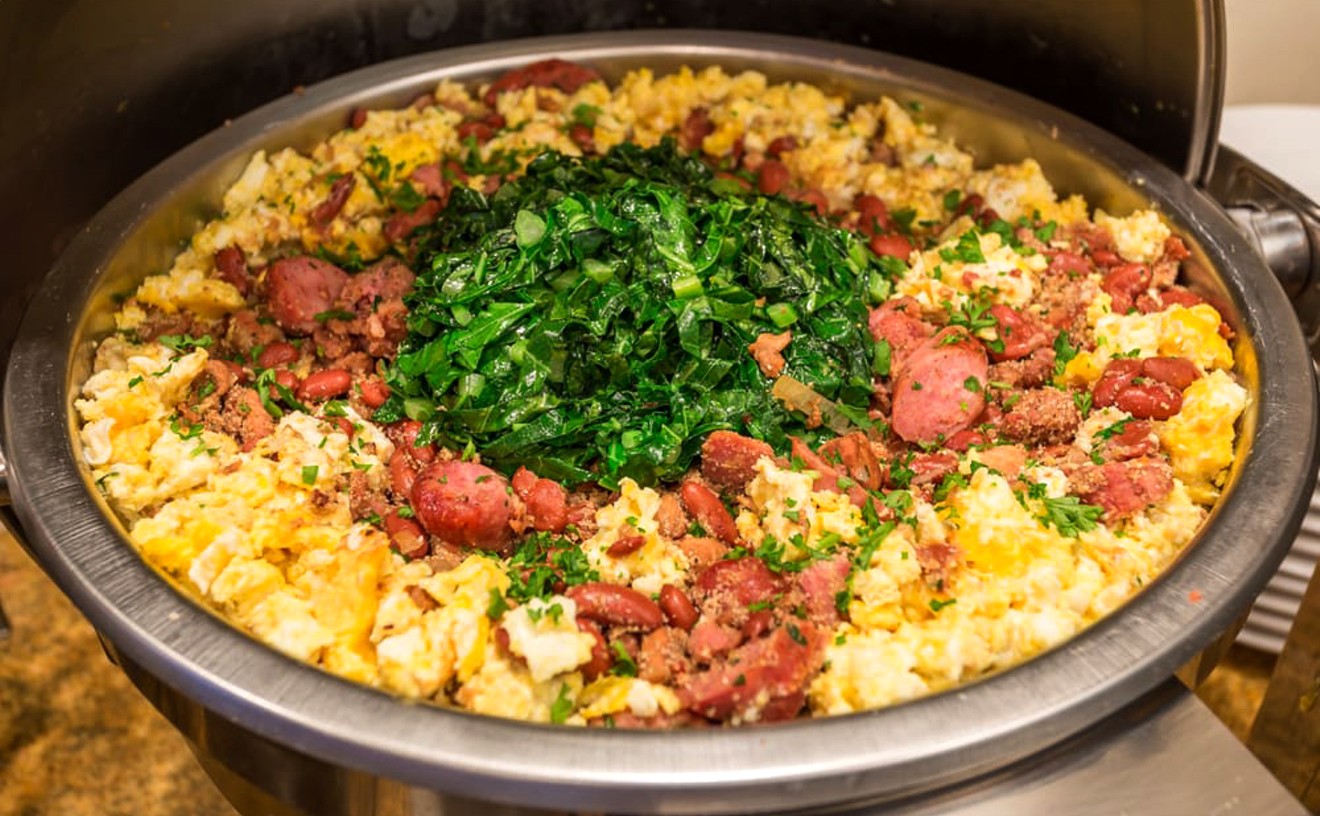
As soon as you settle at a table, the server hands you a large card. Here's what you should do: Slam down the green side, emblazoned with the words "Yes, please." Then sit back and enjoy the procession of piping-hot, juicy grilled meats — flank steak, lamb, ribs, and picanha — until you can't eat anymore. Then you flip the card to the red side, which reads, "No, thanks." It's almost like having a meat-eating contest with your guests and the other patrons taking part in the all-you-can-eat Brazilian buffet. It's hard even to make room for the delicious sides such as yuca fries, sweet plantains, and Brazilian cheese balls. For $27 per person, the buffet is a bit pricey, but Steak Brasil often offers Groupon deals that allow a party of four to eat for less than $100. Aside from offering grilled meats, the menu also lists traditional Brazilian dishes such as moqueca, a steaming saltwater stew made with fish, tomatoes, onions, garlic, and coriander cooked slowly in a terra cotta casserole; and feijão tropeiro, a savory mishmash of beans, sausage, collard greens, eggs, and manioc flour from the southeastern region of the country. Customers also receive a parking rate discount at the nearby Total Bank lot for three hours. Cost: $1. Hours are 11:30 a.m. to 10 p.m. Saturday and weekdays except Monday, when the restaurant closes at 5 p.m., and Sunday noon to 7 p.m.
- 190 SE First Ave., Miami, 33131 Map
- 305-415-2006
- www.steakbrasil.com
Best Argentine Restaurant
Baires Grill

Forgo that expensive plane ticket to Argentina and try one of the three locations of Baires Grill. Grilled meats are plentiful, and best sellers are a Black Angus skirt steak ($29) and a tender flap steak ($27). The indecisive can try them all with an order of a parrillada ($55), which includes skirt steak, flap meat, short ribs, chicken, sausage, and sweetbreads on a flaming gridiron for two or three diners to share. House-made pastas ($18) include butternut squash gnocchi doused in a blend of blue cheese sauce, Malbec reduction, and caramelized figs. There are beef, chicken, and spinach empanadas too ($4.50), as well as dozens of wines by the glass or bottle. The atmosphere is relaxed, with a patio nestled between high hedges and topped by glimmering lights.
- 1116 Lincoln Rd., Miami Beach, 33139 Map
- 305-538-1116
- www.bairesgrill.com
Best Cuban Restaurant
Maruch Restaurant
Ever stop by a Cuban abuela's house and the first thing she says is: "¡Mi hijo! ¡Pero estás tan flaco!" Before you can protest, she's serving you a heaping pile of ropa vieja on top of black beans and rice with a huge slice of yuca on the side. Well, that's what ordering a plate at Maruch is like. This Hialeah culinary institution doesn't know how to serve delicious Cuban dishes any other way. A lunch or dinner for one runs about $15 with a soft drink. For the adventuresome foodie, order the riñonada, calabaza, and fufu de plátano. The sweet flavor of the pumpkin and plantain provides a nice contrast to the steak's salty succulence. Or go for the rabo encendido, the Cuban version of oxtail soup, which patrons gobble up on sight. For diners seeking a safe pick, Maruch serves large slices of chuleta de puerco (pork chop) and palomilla steaks that can be paired with moros (black beans and rice) or cristianos (red beans and rice) for less than $12. A cantina-style restaurant just a few blocks from the City of Progress' administrative building, Maruch is also steeped in political lore. Don't be surprised to run into city gadflies and forgotten politicos in the dimly lit back dining room. You might even catch a crash course in the city's salty civics. Four years ago, erstwhile mayor-for-life Raúl Martínez had a run-in with Glenn Rice, a former Hialeah cop working behind the scenes for the current alcalde, Carlos Hernández. Rice snuck up on Martínez and began recording him. That prompted Martínez to jump out of his seat and accuse Rice of being a "pedophile" and "a man without a life and without a woman." So if you enjoy a side of Hialeah politics with your vaca frita and colada, head to Maruch. The restaurant is open seven days a week from 7 a.m. to 10 p.m.
Readers' choice: Versailles Restaurant
- 92 E. Eighth St., Hialeah, 33010 Map
- 305-805-9302
Best Colombian Restaurant
Manantial Market

"This'll be quick," your friend assures you. "Just a pan de bono and a Postobon, that's it. Promise." Two hours later, you've slugged down who knows how many shots of the fermented rice drink masato, and your clothes bear the thick scent of grilled meat and fried pork belly. If you're looking for someone to thank for this Colombian sandwich oasis located between a Subway and a car wrap shop, give praise to Margoth De Horta, who persuaded her four children to open a place with her so the far-flung family members could be together again. Hence, today you can stop into Manantial for fresh blood sausages, a few quinoa-studded arepas, and a heaping bandeja paisa ($13.25) replete with grilled steak, chicharrones, smoked sausage, rice, red beans, avocado, and a tomato. Eat it up, and you're sufficiently prepared to head back out into the blistering sun and face whatever the world throws your way.
- 6778 W. Flagler St., Miami, 33144 Map
- 786-388-8989
- manantialmarket.com
Best Ecuadorian Restaurant
Mi Lindo Ecuador
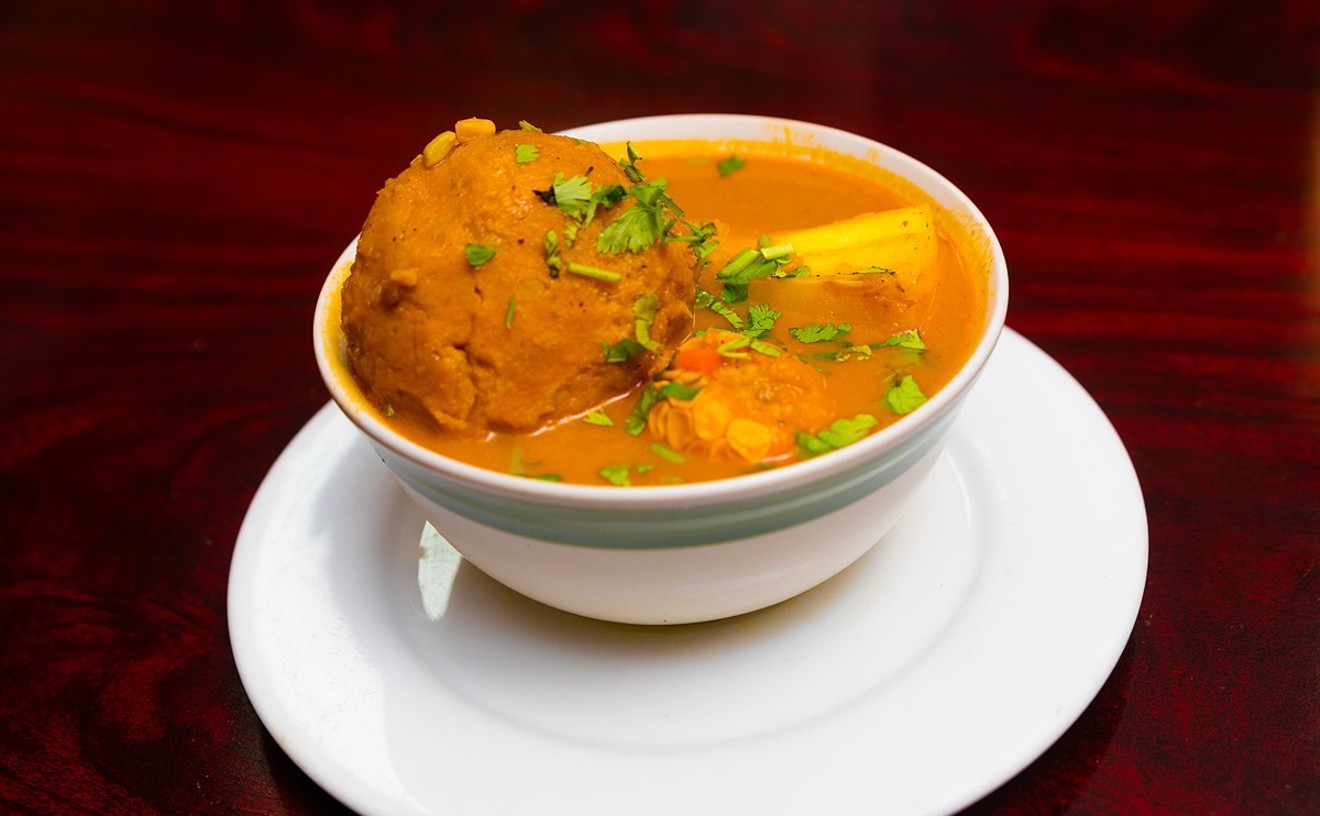
"Enough!" you exclaim after sitting through 20 minutes of traffic on Doral's NW 25th Street. After 30 and then 40 minutes, you're on the verge of tears. But hold on — what's that? You spot the sign for Mi Lindo Ecuador, nestled in a brick-red shopping center. You've plundered Peruvian fare, carved through Colombian cuisine, and annihilated Nicaragua's culinary delights. Ecuador is new territory, and because you're not moving in this traffic, you might as well stop for a snack, right? Smart move. Behold the bolón ($6). In the morning, find it in a breakfast that includes salty white cheese and crisp shards of chicharrón alongside a fried egg and chopped flat steak. At night, order it as an appetizer or side dish with an empanada de verde con queso ($6). For this four-biter, a single unripened plantain is pounded as thin as dough and wrapped around a sturdy rectangle of salty white cheese. A glimpse outside reveals the traffic is still thick as morning fog. Might as well settle in for a bowl of caldo de salchicha ($9), in which a fragrant broth sucks all the deliciousness out of fat blood sausage links while simmering bits of heart and tongue. It's all freshened up with plantain slices and green onion. Now, properly fortified, you'll enjoy a smooth ride home.
- 8726 NW 26th St., #18, Doral, 33172 Map
- 305-718-8577
Best Organic Farm
Harpke Family Farm
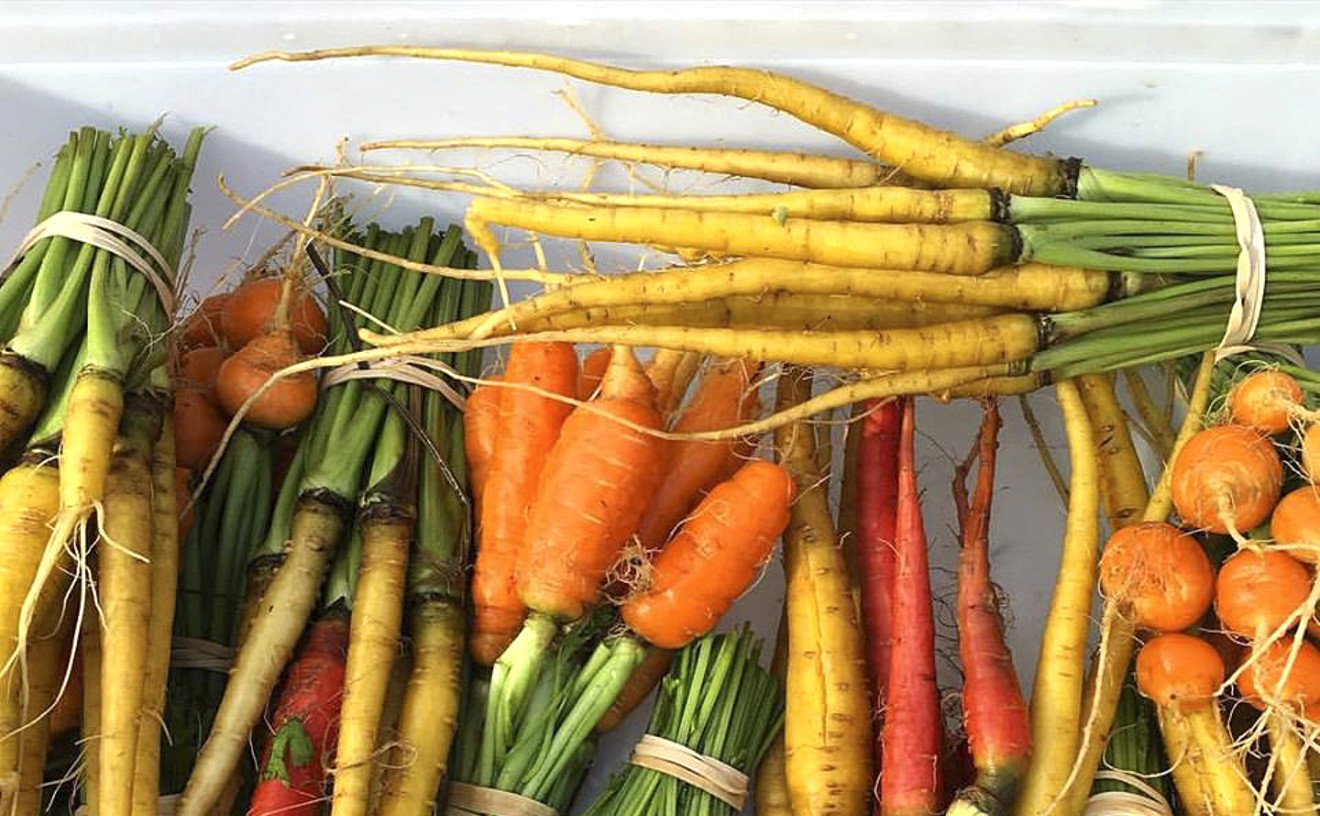
Kohlrabi, lovage, and celtuce are not the most popular baby names of 2017; they're delicious edibles grown organically at Dania Beach's Harpke Family Farm. Built by the soil-stained hands of the enlightened and dedicated Claire and Tamer Harpke, the enterprise began with Tamer growing microgreens in the couple's backyard. They were a hit on the restaurant scene, so the two expanded their business to fill a full farm, complete with friendly pups, regular foodie visitors, a chickee hut for gatherings, and an impressive community-supported agriculture (CSA) program, which delivers weekly bounties of fresh, locally grown produce for $25 to $40 a week (depending upon the size of the share you'd like). Even if you can't make it up to Dania Beach, you can still try the Harpke's handiwork at some of Miami's best restaurants, such as the James Beard Award-winning Alter and Kyu.
- 2781 SW 36th St., Dania Beach, 33312 Map
- 305-803-6764
- harpkefamilyfarm.com
Best Nicaraguan Restaurant
Fritanga Cocina de Doña Angela
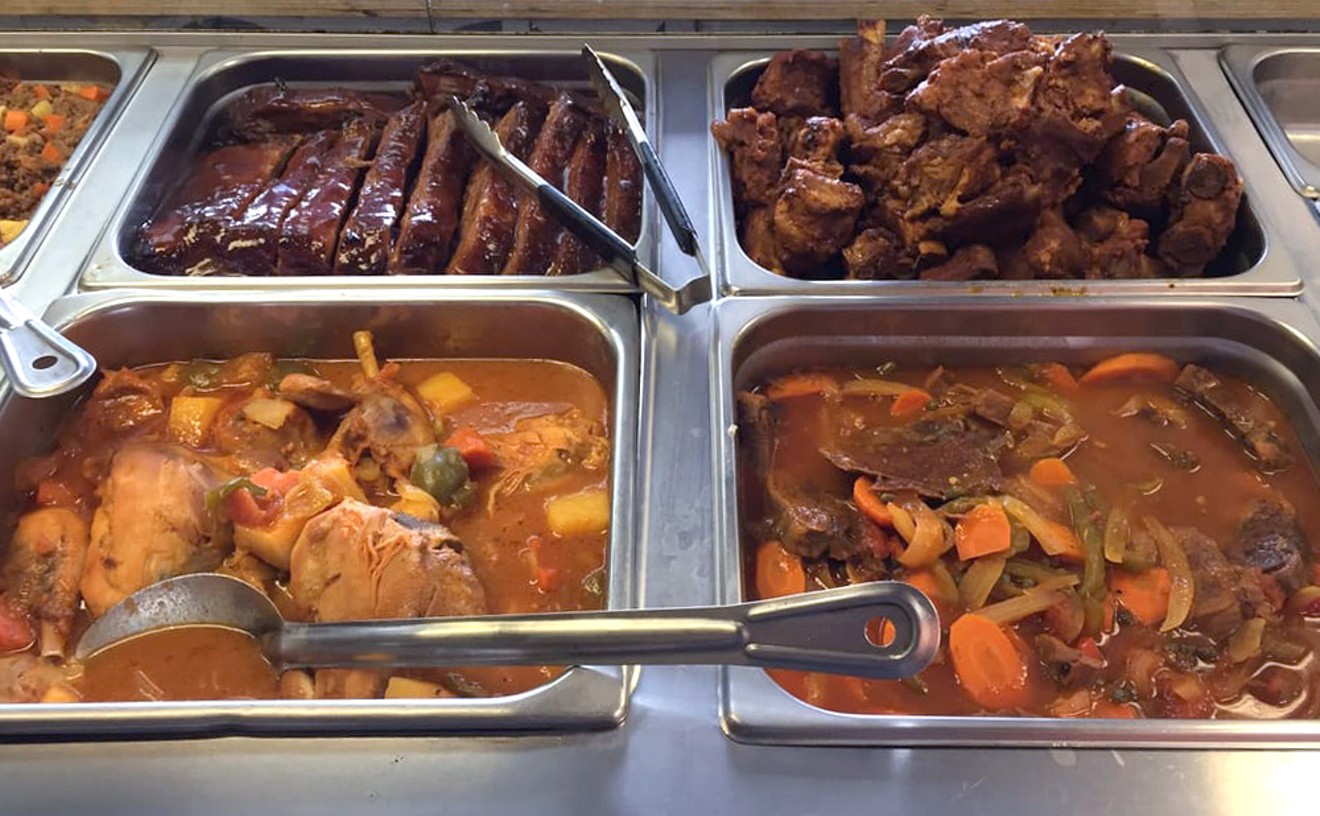
Gallo pinto can mean either spotted rooster or a perfect mixed rice-and-bean concoction. If you want the former, you're out of luck. But nowhere prepares this Central American delicacy more deliciously than Fritanga Cocina de Doña Angela. Off Bird Road a bit west of Tropical Park, this Nicaraguan restaurant will fill you up on side dishes that cost $2 or even less — from gallo pinto to maduros (sweet fried plantains) to queso frito (fried cheese) and curtido (a cabbage salad similar to coleslaw). But don't gorge yourself too early. The $8.99 entrées of carne asada or carne desmenuzada also come with a generous heap of gallo pinto that will sate tu apetito. Chow down here for breakfast, lunch, or dinner. Fritanga Cocina de Doña Angela is open Monday through Saturday from 9 a.m. to 8 p.m. and Sunday from 9 a.m. to 4 p.m.
- 8387 SW 40th St., Miami, 33155 Map
- 305-559-5574
- facebook.com/Fritanga-Cocina-de-Doña-Angela-113543478678955
Best Mexican Restaurant
Taqueria Morelia
These days, everyone has an eye peeled for the next great bite to come out of a gas station. Most of it is thanks to this paper-plate-and-plastic-fork spot that for years has dished out flaky corn tortillas packed with succulent shards of al pastor ($2.45) made with tender pork shoulder dampened with an intense chile arbol sauce that's brightened with a tangy hit of pineapple. The tongue and tripe tacos ($3.95) are just as skillfully griddled, with the former offering tender, almost milky shreds of the offal and the latter as delicate as 48-hour-braised short ribs. The beating heart of the place is a humble-looking salsa bar that each day offers no fewer than a half-dozen sauces ranging from a scorching habanero to a tangy tomatillo. Don't be afraid to pack some into little to-go cups and slather it over everything in your refrigerator.
- 1875 NE Eighth St., Homestead, 33033 Map
- 305-247-0877
- www.taqueriamorelia.com





